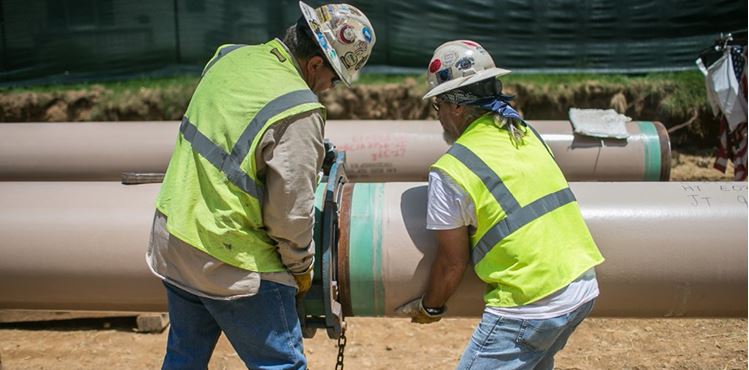Latest PUC Ruling Keeps Pipeline on Track As Opponents Lose Steam

A case that began with demands for the Mariner East pipeline to be shut down has ended with a $2,000 fine, and a growing realization that the $6.1 billion energy project is now all but certain to be completed.
A unanimous vote by the Pennsylvania Utility Commission (PUC) Thursday upheld an administrative law judge’s settlement in the “Safety Seven” case, brought by a group of Chester and Delaware County residents and the Andover Homeowners Association. During testimony in the 2019 hearing, opponents of the pipeline called it an imminent danger to their community and asked the PUC to end the entire project. “Shut down Mariner East before it kills us, pipeline foes implore,” read the headline in the Inquirer.
Instead, the state’s utility regulator ordered Energy Transfer, the company constructing the nearly-completed pipeline, to pay a modest fine, re-work some of its public communications and conduct a “depth of cover” and “distance between other underground pipelines/structures” survey regarding Mariner East 1 and the 12-inch workaround pipelines “as long as they are purposed for carrying highly volatile liquids.”
“We are pleased with the Commission’s action today which affirmed the Administrative Law Judge’s initial decision to deny the majority of the relief requested, but did confirm additional public awareness measures to which the company remains committed,” ET spokesperson Lisa Coleman said in a statement.
The resolution of the “Safety Seven” case sends yet another signal that green activists hoping to shut down the Mariner East pipeline are running out of options.
The 350-mile-long project began in early 2017 and parts of the pipeline are already in use. The pipeline carried natural gas liquids from the Marcellus shale fields in western Pennsylvania to the Marcus Hook Industrial Complex. Pennsylvania is the second-largest natural gas producer in the nation, and demand for the product is surging as Americans shift more energy production from coal and oil to the lower-carbon-emissions alternative.
Opponents of the pipeline have waged a non-stop war to block it, particularly in southeast Pennsylvania. They’ve seized on drilling-related problems along the line, including sinkholes and the inadvertent return of drilling mud that made its way into Marsh Creek Lake. While the company has paid around $16 million in fines, efforts by political opponents of the pipeline to stop the project have been fruitless.
In April, ET entered a consent decree with the Chester County district attorney’s office to resolve lingering issues after a high-profile announcement of a criminal investigation by then-D.A. Thomas P. Hogan. When the consent decree was announced, Seth Weber, a special prosecutor with the Chester County DAO, told Delaware Valley Journal, “We are not stopping the pipeline, nor do we want to.”
Last month, on the eve of announcing his bid for governor, Pennsylvania Attorney General Josh Shapiro announced 48 criminal charges against Energy Transfer over pipeline issues, including one alleged felony. Shapiro acknowledged most of the incidents in the grand jury presentment have already been addressed by the Department of Environmental Protection through civil actions, for which the company has already paid fines and made restitution.
“I’m here to tell you, that’s not enough,” Shapiro said at the time, though he also conceded his efforts would not lead to ending the pipeline’s construction.
That remains the goal of some progressive Democrats like Rep. Danielle Friel Otten, who was on hand at Shapiro’s announcement. “It is time for an immediate halt of the Mariner East pipeline project. I am once again calling on Gov. Wolf, the DEP, and the PUC to revoke Energy Transfer’s permits to operate in Pennsylvania,” she said.
And state Sen. Katie Muth told DVJournal, “A win for the environmental movement would be for this company to be kicked out of Pennsylvania for good.”
After Thursday’s ruling, it appears that is very unlikely to happen.
The full text of the PUC’s ruling can be found here.
Follow us on social media: Twitter: @DV_Journal or Facebook.com/DelawareValleyJournal.



